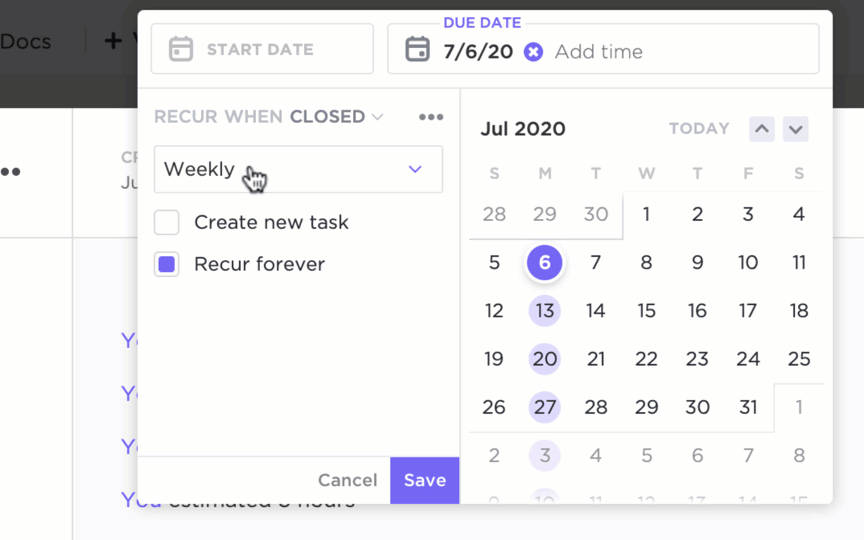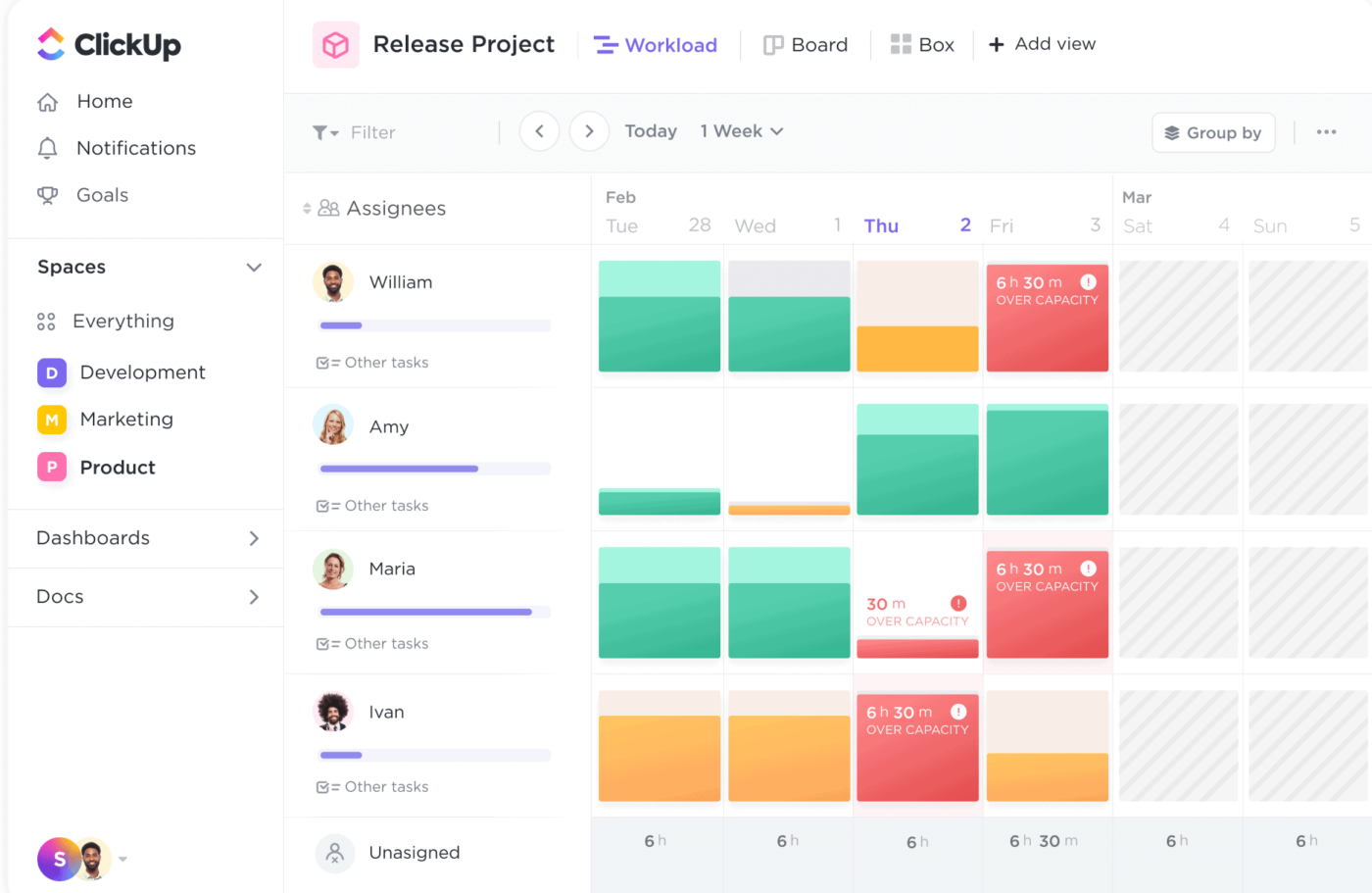How to Delegate Tasks at Work: 10 Tips & Tools to Delegate Effectively

Sorry, there were no results found for “”
Sorry, there were no results found for “”
Sorry, there were no results found for “”
One of the most important aspects of managing a project is delegating work. While you may be a superstar, the fact is, you simply can’t do all of the heavy lifting yourself. You need team members to take on tasks so you can focus on other priorities.
Plus, delegating work enables your coworkers to get involved and play to their strengths.
Whether you lead a small team or oversee multiple projects, handing off assignments to other team members helps you meet your goals and makes the process smoother. But figuring out how to delegate work effectively is sometimes easier said than done—especially if you’re new to management.
Here, we’ll dive deeper into delegation, offer guidance on delegating tasks, and highlight the numerous benefits of handing off work to other team members. Then, we’ll offer tips on how to delegate work so you can be a more effective manager. 🤩
Delegation is the process of reassigning specific tasks to other people on your team. It’s done so that team leads and managers are able to focus their efforts elsewhere while having another team member handle tasks you don’t have time for.
Task delegation also comes into play when a task or activity is better suited to the skillset of someone on the team.
Delegation is a critical component of team management, but it’s also intimidating, particularly for new managers.
Why managers may struggle with delegation
Effective task delegation also requires strong leadership skills and delegation skills. To do it effectively, you need to communicate clearly, be organized, and offer support. You also need to be able to identify when you should do the work yourself and when you should delegate tasks. 🛠️
Knowing the right tasks to delegate isn’t an exact science; it’s more of an art. There isn’t a specific scenario where all tasks have to be delegated. It comes down to your business needs, the bandwidth of your team, and desired outcomes.
However, there are some guidelines you can use to decide which tasks you should hand off in your delegation process. Start by asking yourself the following questions to determine if you should delegate the work:
Deciding how to delegate tasks and which ones are good candidates is a process. Besides asking yourself these questions, consider who you would delegate the work to. Take into account how full their to-do list is, how they’d feel about doing these tasks, and whether or not you think they are likely to succeed. 💪
Now that you know what tasks to delegate and when, it’s time to think about how you will put it into practice. Whether it’s your first time delegating or looking for ways to build your skills, here are 10 helpful tips for effective delegation. 🌻
First, you need to figure out what work you want to hand off. As an entrepreneur, you may delegate just a few tasks to an assistant or freelancer. You might want to delegate dozens of tasks to different departments as a project manager or team lead.
However you choose to delegate, it’s important to think about precisely what you want to transition to other team members.

In general, the following types of work are perfect tasks to delegate:
As a team lead, you know how vital communication is. Delegation is no different. You need to lay out a clear framework and expectations for communication.
This means:
When you delegate work, you want to be sure that the person you’re assigning it to has what they need to succeed. That means knowing their skills and providing opportunities for them to learn relevant new skills.
The best way to accomplish this is to have regular one-on-one meetings. Ask the employee what their career goals are, what they enjoy working on, and if they want to try anything outside the normal scope of work.
Consider their strengths so you can cultivate high-performance teams to match your unique workflow. It’s a lot easier to work from a single view to see strengths and weaknesses play out across your team.
Do they have management skills they can leverage to manage one or two other people on the team? Do they have technical skills that can help your development team?
This is why the ClickUp Skills Mapping Template is so handy for logging detailed information about your team, external members or freelancers, and other assets that could alter your ideal workflow. Whatever their strengths, be sure to consider them alongside the employee’s interests when delegating work. 🏋️
Bonus: Skills Matrix Templates!
Effective leaders know how to prioritize work and how important it is to distinguish which tasks need to be completed first to avoid delaying a project. For delegating tasks, it’s critical to communicate clearly which items must be addressed first.
This way, the team member knows where to start and has a road map for what comes next.

Your work is more successful when you understand its role in meeting the company’s goals. The same goes for team members to whom you delegate tasks.
Help them understand how the task or project they are working on fits into the big picture and the desired outcome you want. If they understand how they contribute to the team and feel like an important piece of the puzzle, they’ll be more likely to want to succeed.
Context also helps your team members fully understand the purpose of the task. While you might be a pro at these tasks, they are new to your co-workers. Offer to walk them through the task or create a video showing how you do it.
💡Pro Tip: Record a quick screen-sharing video with your inputs and ideas using ClickUp Clips
That way, you can feel confident handing off the tasks and knowing your team member has the information they need to complete the work successfully.
If you want to cultivate high-performing teams, you need a structure to help them tackle tasks so both you and your team know exactly what’s expected. Delegating effectively helps everyone know the task at hand.
As a project manager or team leader, you should support your team throughout the project, not just at the beginning when you’re providing context. This can mean offering training if there are skills they need to develop to succeed.
It can also mean providing support regarding resources—like task management software—financial backing or connecting them to experts who can support their work.
💡Pro Tip: Create a channel for the task or project in ClickUp Chat where your team can ask questions, clear doubts, and share updates with you.
Just because the team member completes the task differently from how you would do it doesn’t mean they didn’t do a good job.
Focus on the result rather than how they got there. We learn and work differently, so be open-minded when reviewing each delegated task.
Good work and results are what should matter. 🏆

Trusting the people you work with to do their jobs and on time is wonderful. But that doesn’t mean you should take a fully hands-off approach. Give your team members space and time to finish the work, but schedule regular check-ins.
Discuss how often you want to check in with team members. It should be a balance between not micromanaging and still conducting regular reviews.
Many managers choose to meet fortnightly or monthly. Others working on projects with a longer timeline choose to check in quarterly.
During these meetings, provide support if they have questions or concerns and offer guidance for seeing the work to completion.
As human beings, we like working in a positive environment and seeing our work appreciated and recognized. Celebrate milestones and small wins whenever possible.
This boosts morale, creates a fun environment to work in, and offers incentives to do a good job. 🥳
Successful delegation isn’t just about assigning tasks and seeing them to completion. A key component of delegating is reviewing the process to see what worked and what could have been better. Ask your team members for constructive feedback on the process.
Remember, at the end of the day, you’re responsible for the project’s success. After it’s completed, plan a review to discuss what worked well and what can be improved. You can implement these changes into your workflow management processes for the next project.
💡Pro Tip: Encourage the use of lessons learned templates to structure this process
A good project manager knows how valuable it is to delegate effectively. It allows you to focus your efforts elsewhere, and delegation skills help build your team so everyone performs at their best and at your desired outcome. ✨
Here are some of the main benefits of delegation:
Successfully delegating tasks is a critical skill for any manager, but it’s challenging. Here are some common obstacles that managers may encounter in the delegation process:
If you want to get better at task delegation, try using these tools and ideas.
Teams use ClickUp’s Priority Matrix template to ensure that they’re correctly prioritizing tasks on their to-do lists.
Start by listing all tasks that need to be completed. Assess how important each one is and which ones are urgent.
Plug them into the priority matrix to visually organize what has priority. Team members can use this as a reference for what work they need to focus on first, and they can quickly see what’s coming next.

To delegate a project effectively, provide information on the organizational structure of the project.
Tools like RACI matrices can give the team member insight into project roles, project deliverables, and whom to turn to if any issues arise. 📝
Use ClickUp’s Delegation of Authority Matrix template to streamline decision-making in your team. Nine custom fields let you assign authority, while three views enable you to create an information database so everyone knows who’s in charge of what.
Built-in tracking tools and project dependency warnings inform you of potential risks and milestone successes.
While delegating, provide your team with a tool or method to communicate and share their feedback. This helps identify areas where you both succeeded and figure out room for improvement.
One way to do this systematically is with a Feedback Form in ClickUp with conditional logic to allow nuanced feedback.

Managers sometimes struggle with delegation because they fear losing touch with what’s happening. You can overcome this and empower your teams by adopting collaborative tools that support autonomy while allowing for collective oversight.
All-in-one task management tools like ClickUp are ideal for this, as they combine communication, task management, and reporting in one everything app for work.

Mastering the art of delegation is about knowing what tasks to delegate, whom to assign them to, and how to do it effectively. With these delegation tips and resources, you’re well on your way to implementing successful delegation at all levels of your organization.
Try ClickUp today to handle all your project management processes. From organizing and assigning tasks to creating a priority matrix and using tracking tools to monitor progress, you’ll find what you need to be an effective leader. 👩🏽💼
© 2026 ClickUp